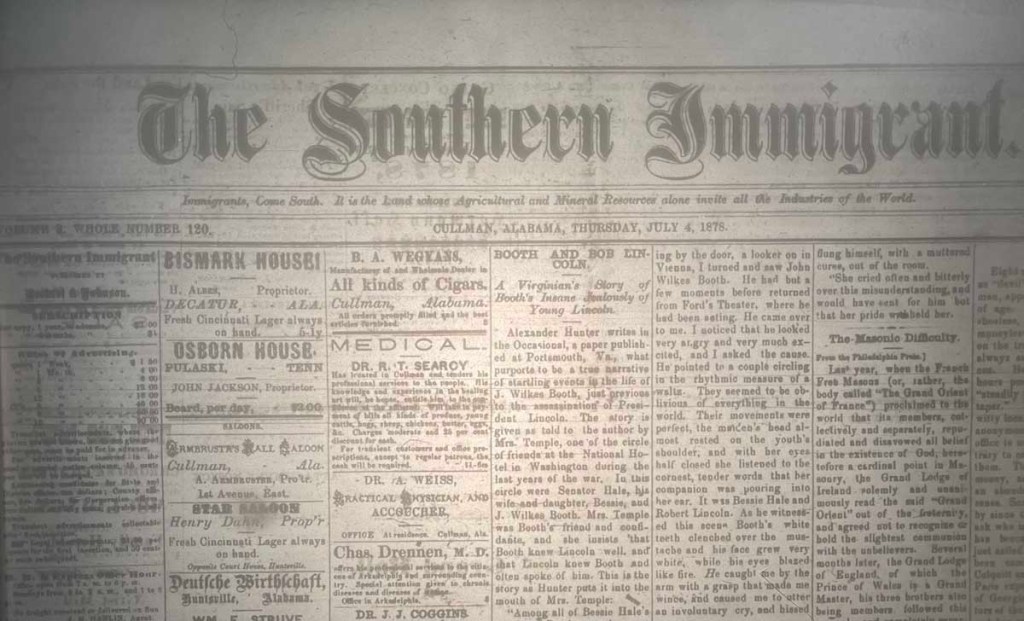From the archives: Visitor describes Cullman’s July 4 celebration in 1878
Published 10:41 am Friday, July 2, 2021

- Southern Immigrant
On July 4, 1878, a visitor from Verbena came to Cullman for a first-hand look at how the mostly German settlement celebrated Independence Day. The following account of the five-year-old town’s July 4 festivities by the visitor referred to only as “Old Fogy” was printed in Cullman’s Southern Immigrant newspaper:
The Fourth of July Celebration
We had intended to publish a full account of the celebration on the glorious Fourth, but the following communication from a correspondent of the Montgomery Advertiser, who was present, precludes the necessity. We prefer that strangers, who have visited our town and county should speak for us. Hence we publish this communication entire, merely adding that we do not believe the correspondent of the Advertiser has exaggerated in the least:
VERBENA, ALA., July 6, ’78
EDITOR ADVERTISER — I have attempted a description of the late excursion of your city to Cullman which may interest some if you deem it worth publishing. Never having seen the new village, and wishing a little recreation on the national holiday, I boarded the train at Verbena.
Before its arrival I anticipated a large number upon it, there being so many of German origin in your city, but was much disappointed, there being but few. But all the more comfort.
After a very pleasant trip with an excellent conductor (Rose) in charge, we reached Cullman in due time, nothing occurring to mar the pleasure of the trip. On our arrival we found a large number awaiting us, and a special committee to receive and escort us to their new and beautiful hall, handsomely decorated for the occasion, and a large number of both sexes awaiting us.
First in the programme a choir of singers welcomed us in a beautiful song. Next an address in German by the worthy mayor, the audience being mostly Germans. Next an address in English complimenting Montgomery and the visitors highly. That required a reply, and no one seeming willing to undertake it, I attempted it, and apparently gave satisfaction. At all events it served to make all acquainted with me, being formally introduced. I was afterwards greeted by all, and overpowered with attention.
The village is upon the top of Sand Mountain, a beautiful level, and 400 feet higher than Birmingham. You can imagine the purity of the atmosphere, and the sympathy with our people, the complete Americanization they have undergone when I tell you every house was adorned with the stars and stripes flung to the breeze combined with the German flag.
The size of the town surprised me, when we reflect that five years since it was a wilderness, now a thriving populous town. This reminds me of an old occurrence, recollected perhaps by some of your old citizens (it occurred when I was your citizen), before the days of railroads. All the stock traders from Tennessee and Kentucky came over Sand Mountain, returning horseback by that route, with the proceeds of their sales with them. A man by the name of Cox was the only settler for miles on the mountain, and necessarily all stopped with him to be fed and lodged. Several in time were missing and never heard of; suspicion was aroused, and a search made; in a deep ravine near his house are found five skeletons — no proof upon Cox, but he left the country. His place is in sight of Cullman (similar to the Bender family in Kansas), now a substantial town, with beautiful shrubbery, all indicating an energetic and industrious population.
Of course my first visit must be to the founder of this colony, whose brain has directed and controlled all public enterprises, Colonel Cullman, living in a beautiful mansion, dispensing a princely hospitality and a welcome to all. After formalities, a cigar (made there) is handed you, and a good one, next a goblet of wine of his own make, and so pressing is he that, had it any intoxicating property, I should have been “how come you so.”
The Fourth was ushered in by a national salute with cannon. At 1 o’clock the procession was formed and marched to the hall. Reading of the declaration and oration, afterwards a concert, and at night a grand ball.
Everything passed off well – very little whisky drank; but lager beer, oh hush! water not in request. As an illustration; a man and wife, with five children, sitting at a table, each with a mug of beer, the lady with an infant and feeding it from hers, thus early cultivating taste for and habit of drinking the national drink.
To sum up, they are the most contended industrious and healthy, good looking class one was ever among. The German type is recognized in their light colored hair and blue eyes.
— OLD FOGY





